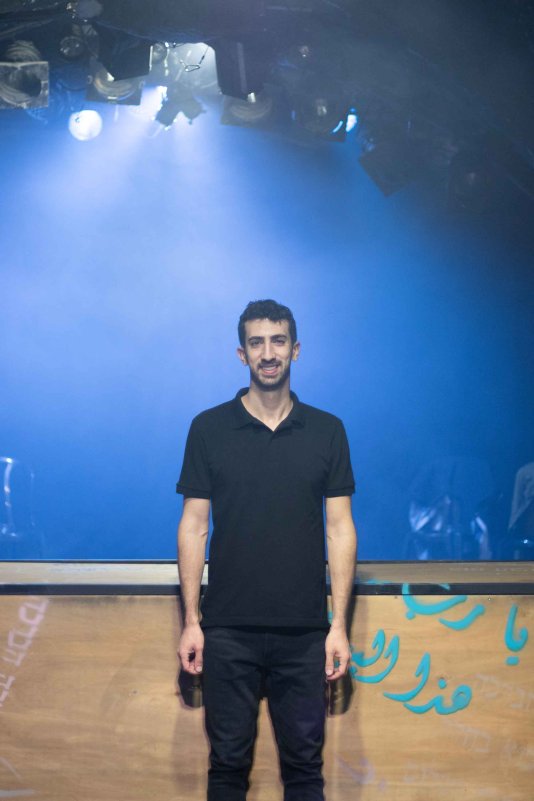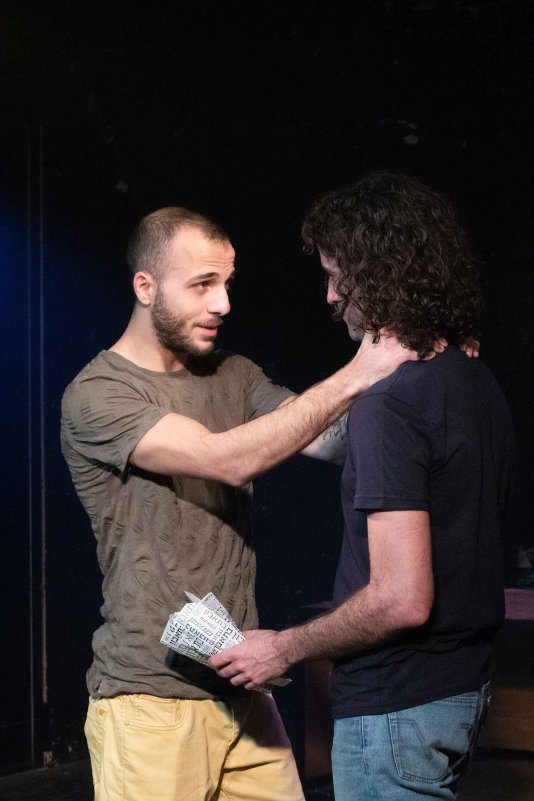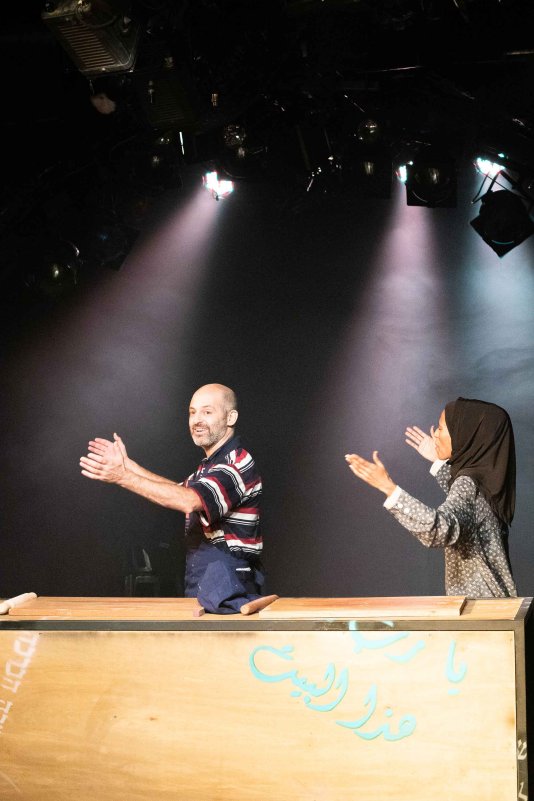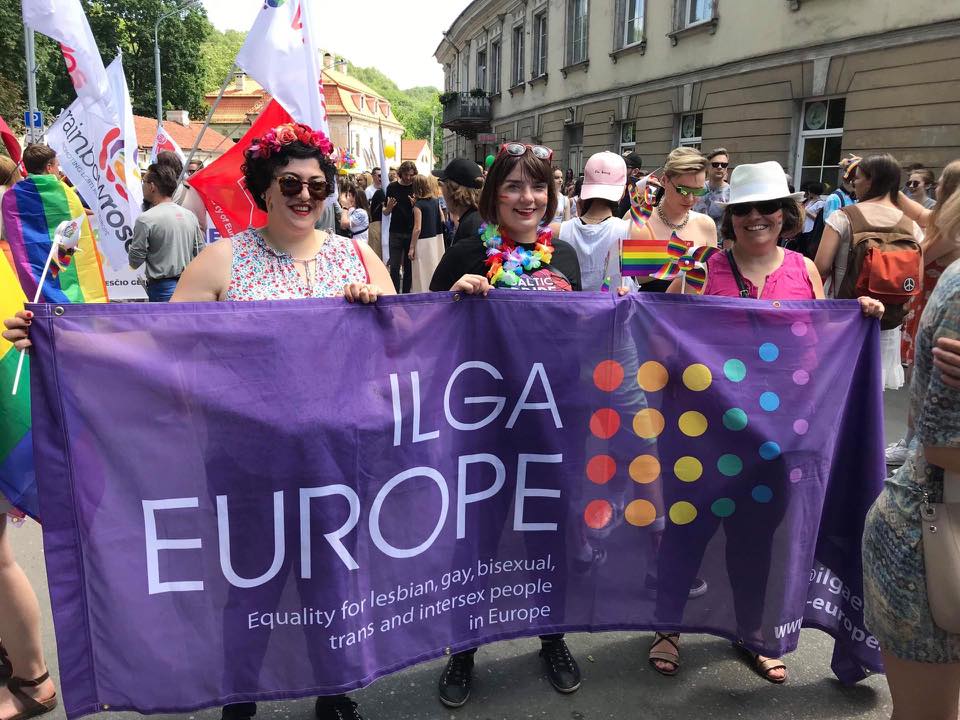- About
- Topics
- Picks
- Audio
- Story
- In-Depth
- Opinion
- News
- Donate
- Signup for our newsletterOur Editors' Best Picks.Send
Read, Debate: Engage.
| January 19, 2023 | |
|---|---|
| topic: | LGBT Rights |
| tags: | #Israel, #Palestine, #LGBTQ+ rights, #art |
| located: | Israel |
| by: | Rajaa Natour |
“We, as Arab LGBT people, are viewed as trash by the Arab-Palestenian society. We are dead in their eyes,” said “M” (who asked to remain anonymous for safety reasons). M’s assertion is rooted in a harsh reality faced by queer people hailing from highly conservative sections of Palestinian society.
In early October, Ahmed Abu Marhia, a 25-year-old gay Palestinian asylum seeker who lived in Israel for the last two years, was kidnapped and brutally murdered in the West Bank city of Hebron as he was awaiting repatriation in a third country.
The Ma’an Palestinian news agency reported that Abu Marhia was beheaded and that the documentation of the heinous crime circulated on social media networks. M said that in order to escape a similar fate, he has had to deny and hide his sexual orientation from his family.
M was born to a poor Muslim Palestinian family in Jenin in the northern part of the West Bank. He worked hard to help support his family, and even paid for his brothers' and sisters’ weddings and got them all settled.
At the age of 20, M began to feel attraction to men, but kept it secret, and when his family started pressuring him to marry he repeatedly refused. He claims his older brother started to suspect that something was “not right” and that he started to watch him closely.
One day, while his older brother was stalking M he allegedly overheard a conversation between M and his former partner. The brother confronted M and had accused him of committing - according to Islam - an unforgivable sin; M denied the accusations at the time, but the older brother didn’t believe him. He allegedly ran to the kitchen to grab a knife with the intention of murdering M. The latter is still alive today thanks to his sister who begged him to jump out of the window and run away.
M did manage to escape from the house unharmed, and later left the West Bank and entered Israel.
"I think that my brother wasn't really sure that I’m gay, I think if he was one hundred percent sure about it he would have stabbed me to death," he told FairPlanet. “But after I fled to Israel, he gathered the family in order to force them to cut ties with me and excommunicate me. They refused. I'm sad to say I continued to deny my sexual identity in order to escape death.”
The threat of murder by close family members and relatives is but one of many challenges Palestinian LGBTQ+ people living in the West Bank face. Israel, which internationally brags about ‘saving’ queer Palestinians from death (in a recent statement by the government, it confirmed it intends to grant a permit to 66 queer Palestinian asylum seekers), occasionally blackmails them and forces them to cooperate with its security forces. It also reportedly exposes the identity of those who refuse to collaborate, which puts their lives in even greater danger.
Furthermore, Israel persecutes queer Palestinians who manage to escape from the West Bank since according to Israeli law they are staying in the country illegally, and introduces additional hardships to their already unbearable living situation.
“My life got so much worse after escaping the west bank - on all levels,” M said in an interview. “I’m facing financial difficulties, I am alone without family support and it is very difficult for me both psychologically and mentally.”
He added, “My life is still in danger, even inside Israel, I have no rights and I have no back, I am alone. I really hope that my life will change, I derive my strength mainly from myself. I have to continue, I have no choice.”
The LGBTQ+ discourse in Arab society is largely silenced, mainly due to religious and cultural reasons. Sadly, conversations about queer issues take place - if in a completely watered-down manner - only when Palestinian LGBTQ+ people are murdered.
But a new play entitled Sharif, written and directed by 29-year-old Tomer Aldubi who lives and works in Haifa, is breaking this silence.
According to Aldubi, the play, which was originally performed at the Haifa Theater and now tours Israel, is based on phone conversations he held with Palestinian LGBTQ+ people when he volunteered at Haabit Hsoneh (Hebrew for the different house), an NGO that supports, among other populations, the Arab LGBTQ+ community and helps its members access their rights.
The play focuses on several significant moments in Sharif's life following the disclosure of his sexual identity, starting with a confrontation with the Palestinian police and ending with his escape to Israel. The play also presents in great detail his encounter with the Israeli Civil Administration, a meeting that, if successful, will grant him permission to stay in Israel and during which he is exposed to unbearable institutional racism. To clarify, the Civil Administration is subordinate to a larger entity known as the Coordinator of Government Activities in the Territories (COGAT), which is a unit in the Israeli Ministry of Defense
The play raises Israeli society’s racism, which is hurled at Sharif as he struggles to navigate his life in a new reality that turns out to be no less cruel than the one he left in the West Bank.
As per the testimonies of numerous queer Palestinians, life doesn't become any easier after escaping to Israel. According to M, "The fear does not go away, it is constant, daily and accompanies me all the time."
“Maybe its immediacy has changed,” he added, “because I have avoided any connection with the Palestinian society in the West Bank after escaping to Israel. But this fear hovers over my head all the time. My familys’ threat has decreased, but I don’t feel safe because first I'm a Palestinian from the West Bank and, second, I'm gay.”
Despite the difficulties they face across the wall, a growing number of queer Palestinians have been fleeing to Israel due to their sexual orientation over the last four years, as their lives in the West Bank are in immediate danger. Israel recognises these particular circumstances and grants them temporary entry permits. These permits can be renewed, but due to various bureaucratic processes they do not always arrive on time.
As a result, these LGBTQ+ asylum seekers become illegal residents, and as soon as the Israeli police find them they are returned to the West Bank, where a bitter fate awaits them.
"Only two years ago I found out that Palestinian LGBT people who flee to Israel have no rights," Aldubi, the play’s writer and director, told FairPlanet. “That's why I chose to tackle this issue, because no one was talking about it.”
"I wanted to influence public opinion," he added. "I didn't think we would present the play in the Palestinian territories. I wanted to raise awareness within both Israeli society and the Israeli gay community, which avoids discussing the problems of the Arab LGBT community."
When asked - based on one of his previous statements - how he is going to "blow up the Palestinian LGBTQ+ discourse" through a Hebrew play that almost exclusively addresses an Israeli audience and ignores the Palestinians whose story it tells, Aldubi claimed that the play does so on several levels.
"This is the first time that a play performing in a leading theater such as Haifa Theater talks directly about Palestinians, presenting a complex and non-stereotypical story about Arabs," he said. "It’s not a comedy in which superficial Arab characters are presented to the Israeli public; it tackles the Palestinian reality.
"I'm not looking to preach to anyone, certainly not to the Arab-Palestinian society. I can't influence the Palestinian internal discourse." He added, "The show sparked a public discourse. It's also being written about, it's exploding internationally, and this is just the beginning."
As Aldubi said, the play did - and continues to - provoke a lively discussion about the tragedy of queer Palestinians on the international arena. But locally, reactions are mixed.
"I received harsh and even very racist responses from the Israeli gay community," Aldubi said. "Many asked me why I chose to deal with Palestinian issues - why am I not talking about Jewish trans communities and about topics related to Jews, etc.
"On the other hand, I received many positive responses from many Israelis - including right wing supporters - who knew nothing about the topic and told me that the play made them think about the situation and fate of this community.
"Palestinians, on the other hand, told me that I should deal with other important issues, not the LGTBQ issues, namely the occupation," he added. "But after the play I received very positive reactions from Palestinians who saw the play, many were moved and said that the play told their story."
It is important to emphasise that the positive responses that Aldubi received do not reflect the entirety of the internal Palestinian discourse. After all, many Palestinian actors refused, according to Aldubi, to play the character of Sharif. Many, he added, didn't even bother to read the play. “They simply heard that it was about the LGBT community [and] refused, because of the stigma surrounding the issue in Arab society.”
Assaf Sorek was eventually cast to play the role of Sharif, and in order to achieve as authentic a character as possible, Aldubi asked a homosexual Palestinian who fled the West Bank and currently lives in Israel to guide the actors and accompany the directing process.
According to Aldubi, this refusal reflects prevalent homophobia, but also stems from “discouragement and ignorance.”
He added, "I was expecting this refusal, because this is a play, among other things, staged by an Israeli theater, even though the financial support was public. I was worried that actors would not want to work with me because I am an Israeli-Jew who is tackling this sensitive issue, but many did not want to work with me mainly because of the topic discussed.”
Aldubi was therefore forced to cast a Jewish actor as the lead. The actor, Sorek, was also told to his face that it would have been better if the person who played Sharif was Palestinian, as his casting perpetuates the power imbalance and oppression that is taking place on the political level.
When asked by FairPlanet how he responded to these claims, Sorek said, "Palestinian actors were afraid that participating in such a play would present them as homosexuals [...] But I believe that my role as an actor is to give voice to people in our society, especially to this story. So when Tomer approached me, I felt that it was a mission, I felt that I had to be part of this story. It was important to me and to all of us to tell this story out and loud."
Contrary to Aldubi, Rita Petrenko, the director of The Different House, claims that it is not the role of Israelis to initiate a Palestinian LGBTQ+ dialogue and bring about change in Arab society, but rather the role of queer Palestinians. She pointed out, however, that such a discourse hasn't emerged yet because the Palestinian LGBTQ+ people still lack a sense of security.
She added that it is necessary to "Give the Palestinian LGBT community a sense of safety and security, to the level they would want to initiate a dialogue and lead a struggle for LGBT people."
"We can lead campaigns," she said, "but it will have no effect, the effect will come from the visibility and statements of the Palestinian LGBT people. But as long as they are afraid, they will not be able to have any dialogue with their society. This is multidisciplinary, multi-layered work that should be implemented over time in order to build a sense of security and protection so that the Palestinian LGBT community lives freely."
Petrenko added that increasing the sense of security of queer Palestinians is not enough, and that it is necessary to change the policy and attitude towards the Arab society in general, particularly regarding the police’s role in maintaining the safety of Palestinian.
LGBTQ+ people in their hometowns and instituting legislative and political changes - including around access to information and visibility.
She stated that, on the one hand, Israel must provide LGBTQ+ Palestinians access to language lessons, as well as matriculation, professional and preparatory courses for colleges and universities. In addition, she stated, the Israeli government should provide employment counseling and aid, psychosocial support and training on the provision of LGBTQ-specific services, among other measures.
On the other hand, she added, there is also a need for structural changes among Israeli NGOs serving the queer community.
“Israeli LGBT organisations have to make their services linguistically and culturally accessible to Arab LGBT members,” she said. “In many cases, organisations (not all, of course) carry out activities for the entire LGBT community; as a result of that - Arab LGBT people are left out, because these organisations do not give enough thought to preserving their privacy and don’t make their activities accessible on a linguistic or cultural level.”
Despite these bleak circumstances, Petrenko remains optimistic. "There are social groups and activists who are operating on a limited scale, as such activities might endanger them," she said. "Therefore, the most pressing issue is [guaranteeing] the personal security of Palestinian LGBT people, in addition to helping them acquire democratic tools so they can conduct a struggle."
Image by Yael Iluz.
Author image by Bar Gordon.
By copying the embed code below, you agree to adhere to our republishing guidelines.



